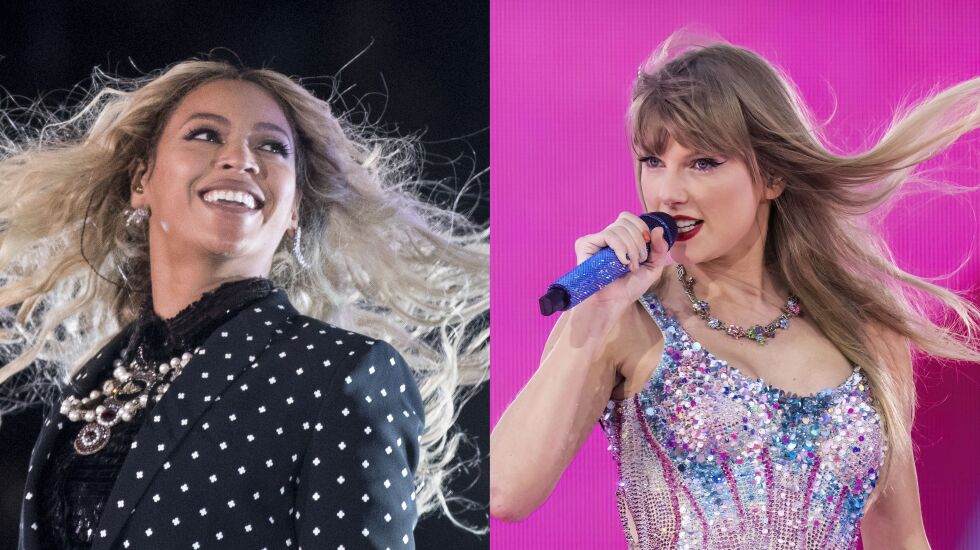
I will never ever, ever find Taylor Swift’s music appealing, but I know all too well there is no shaking off news coverage of the wildly popular singer-songwriter’s every move.
There’s no escape.
Just last week, I inadvertently came across headlines about Swift’s rumored new NFL boyfriend and her appearance at the MTV Video Music Awards where a camera operator was tasked with continuously filming her throughout the broadcast.
Talk about mad love, although the Sun-Times is no stranger to the (anti) hero-worship: Swift landed on the front-page of our newspaper’s print edition for two days in a row during her sold-out run at Soldier Field over the summer.
Gannett took the Tay Tay adulation to another embarrassing level last Tuesday, announcing it was seeking a reporter to exclusively cover Swift for USA Today, as well as the Nashville-based Tennessean. A day later, the country’s largest newspaper chain posted another job opening for its new Beyoncé beat — a knee-jerk diversity, equity, and inclusion afterthought, in my cynical opinion, to mostly keep the less white-bread “Beyhive” from complaining.
Arts and pop culture reporting not only balances the doom and gloom that often embodies hard news, it centers on creative mediums that foster empathy and make readers smile. I acknowledge that Swift is gifted and deserving of some media attention, even though she’s not my cup of tea. But neither she nor Queen Bey, who I do think slays, will find themselves begging for more articles or air time even without a hype man or woman from Gannett, which laid off hundreds of staffers in its news division a year ago.
Devoting journalists to exclusively report on these celebrity icons is “ultimately about maximizing profit,” said Cristina Mislán, an associate professor of journalism studies at the University of Minnesota.
Gannett also gets to play it “safe” by focusing on two women who represent neoliberal versions of feminism and female empowerment without raising too much political controversy or questions, Mislán said.
A gaping news hole on important issues
Anyone who has worked in a newsroom that churns out a print product can attest to the challenges tied to keeping the industry afloat, while remaining relevant to a younger audience that consumes news digitally. The frustration and protests arise when the bottom line starts shaping what stories get told and which ones gets tossed to the side.
As a result, news organizations find themselves “being led” instead of “leading.” said Ibrahim Abusharif, an associate professor of journalism at Northwestern University’s campus in Qatar.
The gaping news holes left by Gannett’s drastic downsizing means many communities, and the issues that affect them, aren’t being written about or adequately explored.
That’s sadly what’s expected, as journalists who are let go or quit aren’t often replaced. The Sun-Times, for example, hasn’t had a full-time music critic for years. Yes, no one forgot about Swift or Beyoncé when they came to town but our bandwidth in the music field — and other areas — has shrunk.
When many newsrooms started shuttering their foreign bureaus a few years back, not too many Americans were concerned. Maybe there never was a demand to learn about the realities of the populations living outside of our borders, or how our country’s policies can detrimentally affect them. Then again, there are many Americans who don’t care about their own fellow citizens either, especially if they don’t share the same racial or religious backgrounds. Such willful ignorance, which we’re seeing in the discussions surrounding the influx of migrants, will only get worse if critical news stories here and overseas lose traction because they’re deemed too boring or don’t sell.
The key criticism over the Swift and Beyoncé reporting jobs, Abusharif said, is “on what is replaced or lost in an industry that is highly competitive and financially stretched and yet charged to serve public interests and our needs to be informed as world citizens.”
“Go ahead and cover entertainers, nothing new here,” he said. “But news hierarchies cannot afford to abdicate their journalistic leadership of keeping critical narratives front and center, no matter how less exciting they may seem. While inventing the Taylor Swift (and Beyoncé ) beats can be seen as a savvy strategic business move, and probably is ... hobbling or supplanting journalism that serves the public interest — investigative reporting and the production of authentic global news narratives — ultimately destabilizes the central value of news journalism.”
Swift’s star power keeps burning bright. And Beyoncé already “runs the world” in her own way. More power to them both. Their immense popularity just doesn’t need to run our newsrooms too.
Rummana Hussain is a columnist and member of the Sun-Times Editorial Board.
Want to write a letter to the editor or an op-ed? Check out our guidelines.







